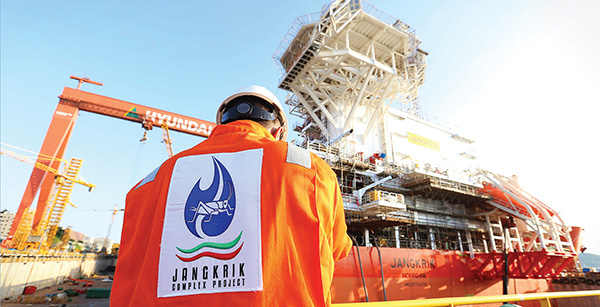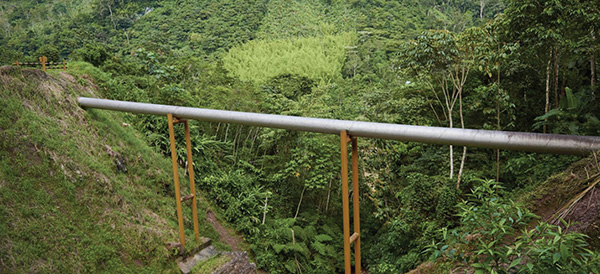January 2019, Vol. 246, No. 1
Global news
Global News
Eni’s Indonesia Gas Project may Start Up in 2021
Indonesia’s deputy energy minister said Eni aims to start output of natural gas in 2021 from its offshore Merakes project, which includes construction of subsea systems and pipelines to transport production to a floating production unit (FPU) approximately 22 miles (36 km) away.

Initial production at Merakes would be 155 MMcf/d, rising to a forecast peak output of 391 MMcf/d. Deputy Minister Arcandra Tahar told Reuters the targets are part of an amended development plan for the East Sepinggan block in the Makassar Strait under a new production sharing contract that is expected to be completed before Dec. 12.
In April 2018, Eni announced its approval of the Plan of Development (POD) for the Merakes field and said the minister of Energy had granted approval three months after submission of the plan.
Eni’s POD foresaw six subsea wells, and the construction and installation of subsea systems and two 28-mile (45-km) pipelines that will be connected to the Jangkirk FPU. The gas will then be shipped through the existing pipelines to the Bontang LNG processing facility operated in East Kalimantan.
As part of the revision, the contractors have agreed to adopt a gross split scheme, whereby Eni and its partner Pertamina would take 67% of crude oil and 72% of natural gas production from the project, and the Indonesian government would take the rest, Tahar said.
Frontera Stops Production after Attack on Peru Oil Pipeline
Toronto-based Frontera Energy said it halted production at Block 192 in Peru’s largest oilfield after vandals severed a Petroperu pipeline and then prevented the state-owned company from sending technicians to repair the damage.
Frontera said it stopped production at the oilfield, located 124 miles (200 km) from the pipeline rupture, after notification from Petroperu of a force majeure event. Frontera, which recently averaged net production of about 8,950 bpd from the block, said it expects “repairs will be completed in a short time” once access is granted.
Petroperu estimated 8,000 barrels of crude oil spilled from its North Peru (Norperuano) pipeline after the attack but said the oil had not contaminated water sources in the area. It blamed the attack on a group of residents in an Amazon region inhabited by the indigenous Mayuriaga community, according to a Reuters report.
Frontera Energy has operations in Peru and neighboring Colombia, where pipelines were targeted in similar attacks throughout 2018. Its contract to operate Lot 192 in Peru is set to expire in March.
The 683-mile (1,100-km) Norperuano pipeline has been targeted in dozens of attacks since it began full operations in 1977. Nearly 20,000 barrels of oil have been spilled from the pipeline in at least 15 attacks since 2016, according to environmental regulator OEFA.
Peace Deal in South Sudan Adds 70,000 bpd of Crude to Market
As the market eagerly awaits an OPEC+ deal, non-OPEC producers continue to make gains. Sudan and South Sudan are likely to raise crude oil production in 2019, according to ESAI Energy’s recently published Africa Watch.
A peace deal in September halted South Sudan’s five-year civil war between forces loyal to President Salva Kiir and others backing Vice President Riek Machar. The peace deal has, for now, stopped fighting that has decimated Sudan and South Sudan’s crude production since the latter’s independence in 2011.
The two countries should be able to raise crude oil output from a combined 230,000 bpd today to about 300,000 bpd in 2019. Relatively quick production gains will be possible at South Sudan’s license Areas 1, 2, and 4 in Unity state, near the border with Sudan. These Indian- and Chinese-operated areas were shut in during the civil war and have a combined capacity of 120,000 bpd. Meanwhile, Sudan hopes to raise output at its only producing area, also on the border with the South, after years of underinvestment before U.S. sanctions were lifted in 2017.
“The governments’ ambitions to double output in 2019 are unrealistic, and the failure of many previous agreements shows that peace is fragile in South Sudan,” explains Amrit Naresh at ESAI Energy. “But crude production in the two countries should rise as long as security conditions continue to improve.”
Politicians Take Aim at NiSource, Columbia Executives
Executives at the utility company responsible for September’s natural gas explosions and fires in Massachusetts faced heavy criticism from congressional members and others at a special hearing in Lawrence, one of three Boston suburbs where the blasts occurred.
During the event held in a middle school gymnasium, six House and Senate members from Massachusetts and New Hampshire portrayed NiSource and its Columbia Gas subsidiary as cutting corners and lacking procedures to prevent or respond to the Sept. 13 disaster. One person died and dozens more were injured in the blasts, which damaged more than 100 homes and left thousands without heat or hot water.
“At every step of the process, there was a chance to avoid this disaster,” said U.S. Sen. Ed Markey to company executives. “Instead of choosing safety, you chose savings. Instead of choosing to do things the right way, you chose to do things the easy way and the result was disaster.”
The National Transportation Safety Board has said the company’s failure to account for pressure sensors in planning a routine pipeline replacement project in Lawrence led to the explosions and fires.
Joseph Hamrock, CEO of NiSource, and Steve Bryant, president of Columbia Gas of Massachusetts, said the company was taking steps to assure another disaster doesn’t happen. That includes adopting many of the initial recommendations from the safety board, such as having a professional engineer sign off on projects before any work starts.
Massachusetts and most other states don’t require that additional layer of oversight for public utilities, but Republican Gov. Charlie Baker has proposed legislation changing that in Massachusetts.
Dakota Access Protester Injured in Blast Files Lawsuit
A New York woman who was injured while protesting Dakota Access pipeline has filed a lawsuit against several law enforcement officers and a North Dakota county.
Sophia Wilansky’s left arm was injured by an explosion that occurred during a clash between protesters and police in November 2016. Her lawsuit, which seeks “millions of dollars” in damages, accuses an unnamed officer of launching an explosive that nearly severed her hand, requiring several surgeries. Officials maintain the explosion was caused by a propane canister that protesters rigged to explode.
The suit also accuses Cass County Sheriff Paul Laney, Morton County Sheriff Kyle Kirchmeier and North Dakota Highway Patrol Captain Tom Iverson of violating her constitutional rights and defamation, among other charges.
Wilansky lost an earlier legal battle for the return of shrapnel and clothing taken as evidence while she was hospitalized after the injury, or an opportunity to have the items analyzed by a forensic scientist of her hiring. A judge ruled that Wilansky did not provide evidence or argument that she could not commence a timely civil action without first gaining access to the evidence.
Newcomer Wins Major Gazprom Pipe Contract, to Market’s Surprise
Russia’s ZTZ said it has won a contract to sell half a million tons of pipes to gas giant Gazprom next year for the construction of part of the Power of Siberia pipeline. ZTZ said the contract is worth over $641 million (42 billion rubles).
Gazprom is obliged to hold tenders for such contracts, but news that the contract had already gone to ZTZ, which only entered the market three years ago, came as a surprise to other producers, who frequently take part in such tenders.
Other pipe producers were not aware that the contract had been offered, two industry sources told Reuters. Official documents show Gazprom filed notice on Russia’s official procurement website Nov. 19 to hold a tender to buy 500,000 tons of pipes, and that the tender closed within 26 hours.
It was the second time Gazprom had held a tender for this project. Its first attempt fell through in October after all major domestic pipe makers refused to take part, with sources in the sector saying Gazprom had set the price too low.
Sources told Reuters in February that Kremlin-controlled Gazprom was seeking discounts — put by the sources at 20 percent — in an attempt to limit its investment spending, which is due to peak in the next two years.
Malaysia Completes Repairs to Key Sabah Sarawak Gas Pipeline
Malaysia’s Petronas said pipeline issues that have been blamed for the country’s falling LNG exports have been addressed and production at the Kebabangan gas field in the eastern state of Sabah was expected to return to full capacity by August 2019.
The problem was caused by a leak from the Sabah Sarawak Gas Pipeline in January, Petronas said in an emailed statement to Reuters. Repair works on the pipeline have been completed, and integrity assurance tests being conducted on the 311-mile (500-km) pipeline are expected to be finished by July 2019, the state energy firm said.
Malaysia’s finance minister said the country’s economic growth was impacted by supply disruption at the Kebabangan gas field. The country’s economy grew at its slowest in two years in the July-September quarter, in part because of “supply shocks” in the LNG sector. Growth in the prior quarter had also been hit by supply disruptions.
Bakken Oil Flows Pressure Gulf Coast Crude Grade Prices
Crude flowing from North Dakota’s Bakken shale is taking a larger share of the U.S. Gulf Coast market, siphoning demand from refiners and exporters for local grades, traders and brokers said.
Bakken crude at Beaumont and Nederland, Texas, traded around a $2 per barrel discount to Light Louisiana Sweet (LLS) in late November, a spread that has made Bakken crude more attractive.
The influx of Bakken crude may not be enough to weigh on prices for West Texas Intermediate at East Houston, because the grade commands a larger, more diversified market than LLS.
Phillips 66 and Bridger Pipeline announced preliminary plans for a pipeline to transport 350,000 bpd of Bakken and Rockies crude oil production to Corpus Christi, Texas. If approved, the project would include construction of new and expansion of existing pipelines with targeted completion in late 2020. P&GJ






Comments